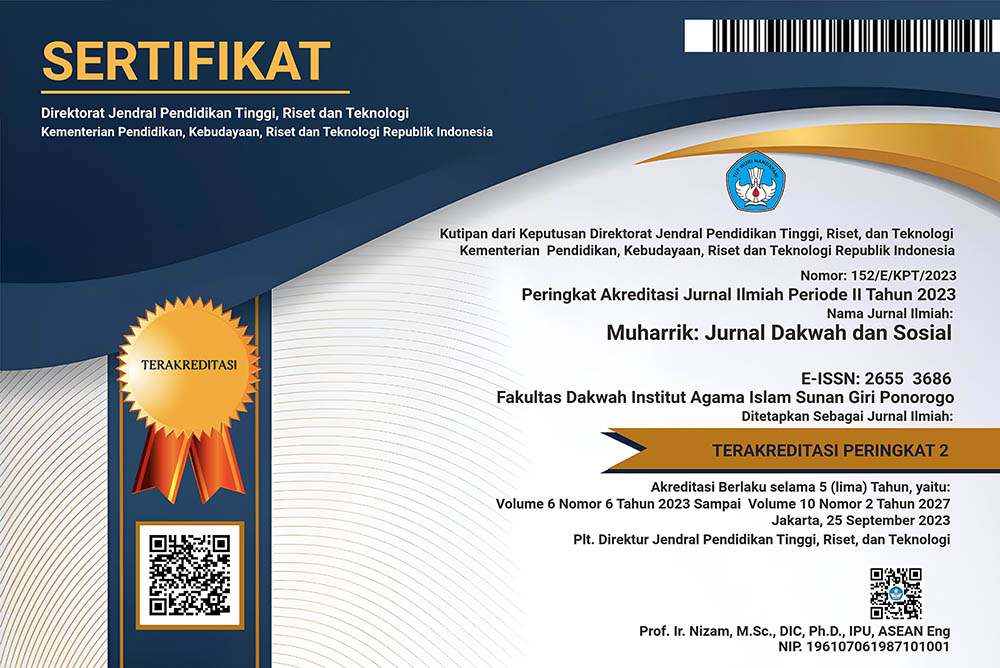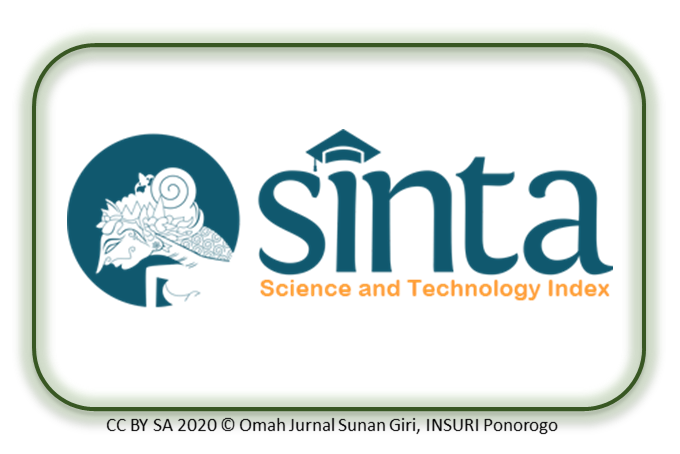Ritual Nyadhar, Ecology and Gender
Keywords:
gender, ritual nyadhar, ecologyAbstract
Nyadhar is a ritual to build togetherness to show gratitude for the gift of salt as a source of livelihood, hope, prayer for salvation, and blessings of Life in the future. Nyadhar is an ecologically oriented ritual only held in the salt pond area, it’s done by the local community, and surrounding areas. Not only the ecological perspective but the gender perspective is also shown in the rituals. This study aims to explain ecology and the role of Madurese women in nyadhar rituals, especially in salt ponds in Pinggir Papas village, in Sumenep Regency. This research was conducted with an ethnographic approach with data collection techniques from several sources, including literature study, participatory observation, and interviews. This ritual shows the perfect relationship between God, nature, and humans. The nyadhar ritual shows the peculiarities of ritual in the salt pond ecology, firstly, the relationship of actor networks between men and women in various circles. Second, special equipments in rituals. Every man and woman has a steady, permanent role that cannot be fought for. The role is not seen as competition but as order and conformity.
References
De Jonge, H. 2012. Garam, Kekerasan, dan Aduan Sapi: Esai-esai tentang Orang Madura dan Masyarakat Madura. Yogyakarta: LKiS.
Niehof, A. 1987. “Madurese Women as Brides and Wives” dalam Indonesian Women in Focus. The Netherland: Foris Publication Holland.
McGraw, John J. dan Jan Kratky. 2017. “Ritual Ecology”. Journal of Material Culture. P 1-32.
Salim, A.M.K.I.S. 2017. Fikih Sunnah Wanita: Referensi Fikih Wanita Terlengkap. Terjemahan. Jakarta: Qisthi Press.
Spradley, J.P. 2007. Metode Etnografi. Yogyakarta: Tiara Wacana.
Rohmawati, A. dan Ismail, H. 2017. “Ziarah Makam Walisongo dalam Peningkatan Spiritualitas Manusia Modern”. Sumbula: Jurnal Studi Keagamaan, Sosial, Budaya 2 (2), 612-627).
Roziqy, Faizal. 2015. Sinkretisme dalam Budaya Nyader di Kabupaten Sumenep (Studi Kasus di Desa Pinggir Papas Kecamatan Kalianget Kabupaten Sumenep). Skripsi. Universitas Jember: Jember
Zubaidi, Ahmad. 2016. Islam dan Budaya Lokal; Upacara Nyadar bagi Masyarakat Islam di desa Pinggir Papas Kabupaten Sumenep. Skripsi: Universitas Islam Negeri Sunan Ampel: Surabaya.
Chotimah, Hosnor. 2007. Ritual Tradisi Nyadar dan Pengaruihnya bagi Kehidupan Sosial Warga Desa Pinggir Papas di Madura. Skripsi. Universitas Islam Negeri Syarif Hidayatullah: Jakarta.
Chen, E.S. dan Tom R.T. 2001.”Cloaking Power: legitimizing Myths and The Psychology of The Advantage”.in A.Y. Lee-Chai&J.A. Bargh (Eds.), The Use and Abuse of Power: multiple Perspectives on The Causes of Corruption. Psycology Press. P. 241-261.
Littler, Jo. 2017. Againts Meritocracy: Culture, Power and Myths of Mobility. London: Rouledge
Limbing, Lexy P.B. 2016. “Pilgrimage Tourism in The Tombnof Gus Dur”. The 4th Tourism and Hospitality International Conference. P.72-76.
Liberman, Zoe dkk. 2018. “The Early Social Significance of Shared Ritual Actions”. Cognition. Vol. 171. P.42-51
Fales, Evan. 2013. “Is a Science of The Supranatural Possible” dalam Philosophy of Pseudoscience: Reconsedering The Demarcation Problem. USA: University of Chicago Press. P.247-262.
Downloads
Published
Issue
Section
License
The author(s) retain/s the copyright and grant/s Muharrik: Jurnal Dakwah dan Sosial the first publication rights licensed under the Creative Commons Attribution-NonCommercial 4.0 International (CC BY-NC 4.0) , which allows others to access (search, read, download and quote), share (copy and redistribute the material in any media or format) and adapt (mix, modify and develop) works for legitimate non-commercial purposes, with recognition of the authorship of the work and its initial publication in this journal.













